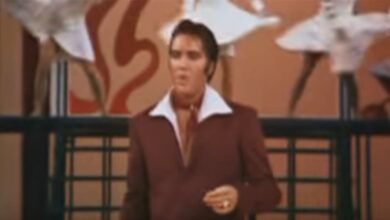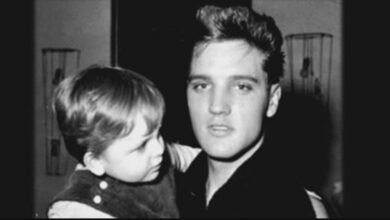“Elvis Presley’s Most Heartfelt Song Is ‘Love Me'”
In the landscape of 1950s rock and roll, few partnerships proved as influential as that of songwriters Jerry Leiber and Mike Stoller. Their innovative approach to music not only shaped the genre’s sound but also proved pivotal in the careers of various artists, particularly Elvis Presley. After achieving significant success with “Hound Dog,” Leiber and Stoller found themselves navigating the interests of music publishers and audiences who craved fresh and engaging material. Their ability to blend humor with poignant themes became a hallmark of their songwriting, leading to a unique legacy that continues to resonate in today’s music.
The duo’s creative process frequently drew from the rich tapestry of existing musical works, infusing them with new energy and context. This was particularly evident when they set their sights on reinterpreting “Love Me,” originally recorded by Willy and Ruth in 1954. This R&B staple, which had seen various artists take a swing at it, provided fertile ground for Leiber and Stoller’s wit and innovation. As music publisher Jean Aberbach encouraged them to explore the playful side of songwriting, Leiber and Stoller crafted “Love Me” not as a straightforward love ballad but rather as a satirical take on the archetypal hillbilly song, juxtaposing lightheartedness with depth.
Interestingly, the initial reception of “Love Me” was colored by its playful origins, with the writers approaching it as a jest rather than a serious expression of longing. Aberbach’s willingness to embrace this angle showcased an evolving understanding of what rock and roll could encapsulate—an exploration of not only romance but also humor and irony. This faith in their artistic vision brought the song to the forefront of Elvis’s evolving repertoire, marking a significant moment in the continued development of his musical identity.
By the time Elvis recorded “Love Me” in 1956, he was already a significant figure in the rock and roll revolution. His interpretation of the song, however, showcased a different facet of his artistry. Originally intended to convey a sense of playful submission in love, Presley’s blues-infused vocals and emotional delivery transformed the lyrics into a heartfelt plea. This contrast between the upbeat tempo and the lyrical yearning gave the song a unique resonance that connected with listeners on a profound level, inviting them to reflect on their own experiences of love and longing.
Despite its inclusion in his second album, “Elvis,” and his EP “Elvis Vol. 1,” “Love Me” did not achieve the same level of recognition as some of Presley’s other hits. Unlike “Love Me Tender,” which was strategically promoted as a single and became a major success, “Love Me” was relegated to the background of Presley’s discography. This discrepancy in visibility raises questions about how certain tracks capture public imagination while others resonate deeply without receiving their due recognition.
In his live performances, Presley breathed new life into “Love Me.” By increasing its tempo and engaging directly with his audience, he created a shared experience that resonated with the realities of love and connection, even as he injected his signature charisma. These performances showcased his ability to meld the playful and the vulnerable, an artistic duality that became a defining characteristic of his career. Fans who experienced him live often spoke of the electric atmosphere he created, transforming even lesser-known songs into unforgettable moments.
As time has passed, the significance of “Love Me” seems to have diminished in the broader narrative of Presley’s musical legacy. However, its unique narrative voice and playful undertones deserve reassessment. The song encapsulates a time when rock and roll was still in its infancy, balancing between genres while pushing the boundaries of lyrical content. It reflects the spirit of an era defined by creativity and artistic exploration, elements that continue to inspire contemporary musicians.
Elvis Presley himself remains a pivotal figure in the history of music, known not just for his vocal talent but for his ability to merge different musical influences. Born in Tupelo, Mississippi, in 1935, he grew up listening to a wide variety of music, from gospel to country to blues. This eclectic background informed his unique style, allowing him to transcend traditional boundaries and connect with diverse audiences. With a career that spanned just two decades before his untimely passing in 1977, Presley transformed the music industry and left an indelible mark that historians and fans alike continue to celebrate.
For today’s audience, revisiting “Love Me” serves as a reminder of the complexity and depth that characterize Elvis Presley’s work. It is more than just a song about love; it is an invitation to explore themes of vulnerability, desire, and the playful aspects of relationships. When listeners engage with the track, they are reminded of Presley’s extraordinary ability to convey emotion, capturing the very essence of the human experience through music. The richness of “Love Me” highlights the importance of recognizing and appreciating all facets of an artist’s body of work, ensuring that even the underrated gems receive the attention they deserve.
As the legacy of Elvis Presley continues to be celebrated, let us revisit “Love Me,” allowing it to resonate within the broader context of his extraordinary career. By appreciating the song’s layered meanings and its playful origins, listeners can better understand the evolution of not only Presley as an artist but also the genre of rock and roll itself. The emotional power of “Love Me” is a testament to Presley’s enduring impact and the timeless appeal of well-crafted music that speaks to the heart.



